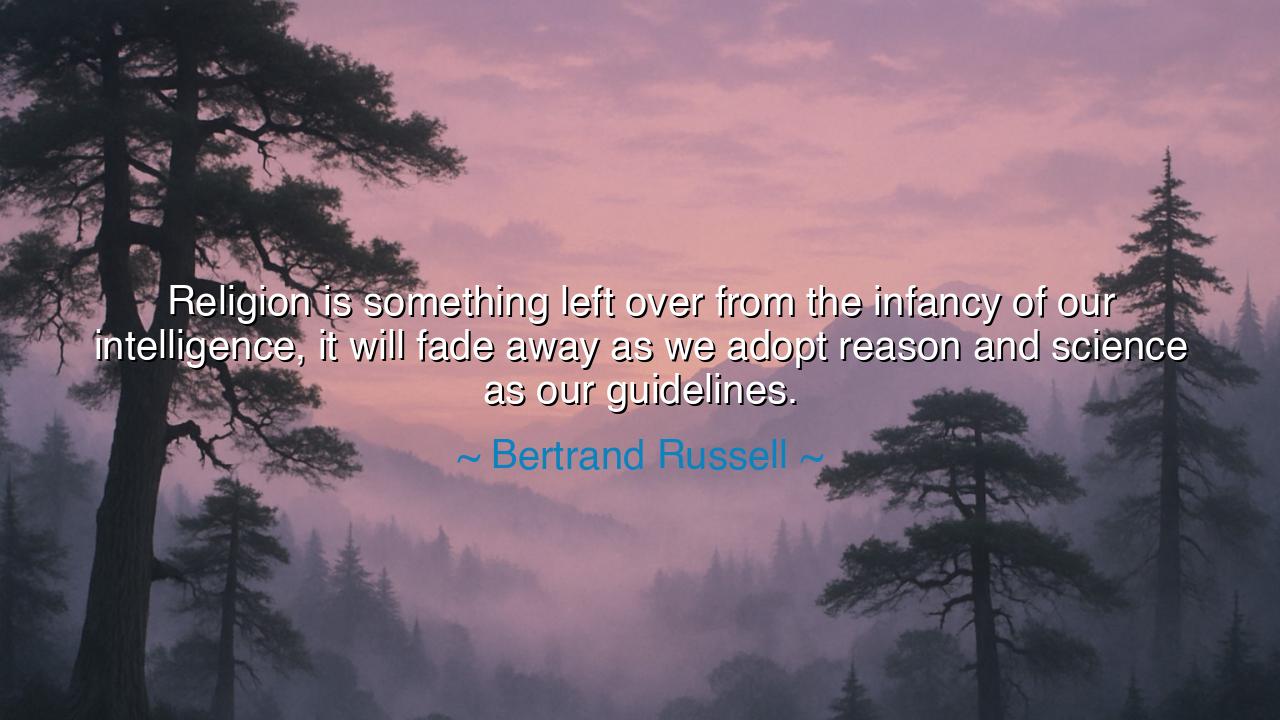
Religion is something left over from the infancy of our
Religion is something left over from the infancy of our intelligence, it will fade away as we adopt reason and science as our guidelines.






In an age of great upheaval, when the old certainties of faith began to tremble before the new light of knowledge, there arose a thinker whose mind was sharp as a blade and whose words sought to carve truth from mystery — Bertrand Russell. With calm conviction, he declared: “Religion is something left over from the infancy of our intelligence, it will fade away as we adopt reason and science as our guidelines.” These words, though spoken in the spirit of reason, echo with the tone of prophecy. They challenge humanity to awaken — to rise from the cradle of superstition into the dawn of understanding.
Russell’s origin of thought lies in the long struggle between faith and reason that has shaped civilization itself. In the infancy of humankind, the world was vast and terrifying, filled with thunder, famine, and death. Not yet armed with knowledge, our ancestors turned to religion — to gods and spirits — as explanations for what they could not comprehend. In fire they saw divinity; in the stars, they saw destiny. Religion was born not from folly, but from wonder. It was the first light in a dark and fearful night — but, as Russell believed, it was only the first light, not the last. For just as a child must one day outgrow the stories of childhood, so must civilization, he said, move beyond myth to the truth discovered through science and reason.
To Russell, this was not an act of rebellion, but of maturity. He did not seek to destroy the beauty of faith, but to free the human mind from its bondage to fear. He saw reason as the next evolution of the spirit — the means by which mankind could understand creation not through revelation, but through exploration. In his eyes, science was the new temple, and its priests were the seekers who dared to question, measure, and prove. The universe, once ruled by invisible hands, now revealed its patterns through mathematics and observation. For Russell, the discovery of truth through evidence was a higher reverence than worship through submission.
History bears witness to this slow awakening. When Galileo raised his telescope to the heavens, he saw moons orbiting Jupiter and declared that Earth was not the center of creation. The church condemned him, for his truth threatened the comfort of old belief. Yet centuries later, the world would see that Galileo’s courage marked not the death of faith, but the birth of enlightenment. So too, when Charles Darwin revealed that life evolved through natural selection rather than divine decree, the shock of his discovery shook every altar — yet from that tremor arose a new humility, a new awe before the complexity of life. In this way, reason and science did not destroy wonder; they deepened it.
And yet, Russell’s words, though bold, must be tempered by reflection. For even as he proclaimed the fading of religion, the human heart still seeks meaning. The mind may thrive on logic, but the soul hungers for connection, purpose, and love. Perhaps, then, the infancy of our intelligence is not only about belief in gods, but about division — the tendency to see reason and faith as enemies rather than allies. The wisest among us might say that when science explains how the stars burn, and spirit reminds us why they matter, both voices speak in harmony.
Still, Russell’s challenge remains sacred: to never let fear rule the mind. The reason he exalts is not cold or lifeless; it is a call to courage — to question, to seek, to doubt even what we hold most dear. To live by science is not to live without wonder, but to find wonder in truth itself. The flame of curiosity that once built temples now builds laboratories; the reverence that once lifted prayers now lifts telescopes toward the heavens. This, Russell believed, is the true maturity of the human spirit.
So let this be the lesson passed down: cherish the wisdom of faith, but do not fear the power of reason. For truth is not an enemy of the divine — it is the divine made clear. Do not cling to the symbols of childhood when the light of understanding calls you forward. Think freely. Question bravely. Stand firm in your search for truth, even when the old certainties crumble. For only by embracing the union of heart and mind, wonder and wisdom, can humanity fulfill its destiny — to rise, at last, from its infancy into the radiant dawn of its intelligence.






AAdministratorAdministrator
Welcome, honored guests. Please leave a comment, we will respond soon